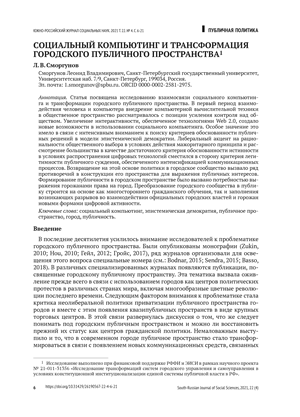Abstract
The article explores the interaction between social computing and the transformation of urban public space. In the first period of human-computer interaction, the introduction of computer technology into public space was seen through the perspective of strengthening control over society. The increased interactivity provided by Web 2.0 technologies has created new opportunities in the use of social computing. This was particularly so because of the heightened concern to find criteria for the validity of popular solutions in the model of epistemic democracy. The liberal emphasis on the efficiency of social choice under the majoritarian principle and the consideration of the majority as a satisfactory criterion for the validity of truth under conditions of the spread of digital technologies has drifted toward the criterion of legitimacy of public judgment provided by the intensification of communicative processes. The return of politics to the urban community on this basis led to some controversy in the design of its space for the expression of public interests. The shaping of publicity in the urban environment was triggered by the need for the city residents to voice their right to the city. The transformation of the urban community into the city public is based on both, multifaceted civic learning and the filling of the emerging gaps in the interaction between the official city authorities and the city residents with new forms of digital activity.
Keywords
Funding information
The reported study was funded by RFBR and EISR according to the research project No. 21-011-31356.
References
Гейл, Я. (2012). Города для людей. Москва: Альпина Паблишер.
Гройс, Б.Е. (2017). Публичное пространство: от пустоты к парадоксу. Москва: Стрелка Пресс.
Желнина, А.А. (2015). Креативность в городе: реинтерпретация публичного пространства. Журнал социологии и социальной антропологии, 2(78), 45–59.
Лебедева, Е.В. (2016). Трансформация публичного пространства постсоветских городов. Социология, 4, 107–115.
Михайлова, Е. (2020). Слактивизм: современные ИКТ как ресурс формирования и артикуляции общественного мнения. Международная жизнь, 3, 96–105.
Птичникова, Г.А., Черничкина О.В. (2019). Информационно-технологическая модель общественного пространства современного города. Градостроительство и архитектура, 9(2), 53–60.
Соловьев, А.И. (2021). «Доказательная политика» и «политика доказательств»: дилемма постсоветских обществ. Контуры глобальных трансформаций: политика, экономика, право, 14(5), 61–80. DOI: 10.23932/2542-0240-2021-14-5-3
Турен, А. (1998). Возвращение человека действующего. Очерки социологии. Москва: Научный мир.
Amin, A. (2008) Collective Culture and Urban Public Space. City, 12(1), 5–24, DOI: 10.1080/13604810801933495
Basso, S. (2018). Rethinking Public Space Through Food Processes: Research Proposal for a “Public City”. Urbani Izziv, 29, 109–124.
Benson, J. (2019). Knowledge and Communication in Democratic Politics: Markets, Forums and Systems. Political Studies, 67(2), 422–439.
Bodnar, J. (2015). Reclaiming public space. Urban Studies, 52(12), 2090–2104.
Calhoun, C. (1986). Computer Technology, Large-Scale Social Integration, and the Local Community. Urban Affairs Quarterly, 22(2), 329–349.
Chen, J. & Liu, J. (2014) Introduction: Social Computing and Social Networks. Journal of Organizational Computing and Electronic Commerce, 24(2–3), 119–121, DOI: 10.1080/10919392.2014.896712
Cohen, J. (1986). An Epistemic Conception of Democracy. Ethics, 97(1), 26–38.
Danziger, J. (1986). Computing and the Political World. Computers and the Social Sciences, 2, 183–200.
Denning, P. (2010). Computing Science: The Great Principles of Computing. American Scientist, 98(5), 369–372.
Evans, J. (2020). Social Computing Unhinged. Journal of Social Computing, 1(1), 1–13. DOI: 10.23919/JSC.2020.0002
Goodin, R., Spiekerman, K. (2018). An Epistemic Theory of Democracy. Oxford: Oxford University Press.
Hannon, M. (2022). Are knowledgeable Voters better voters? Politics, Philosophy & Economics, 21(1), 29–54.
Hou, J. (2010). Insurgent Public Space: Guerrilla Urbanism and the Remaking of Contemporary Cities. New York: Routledge.
Karaliotas, L. (2020) Ronan Paddison on Public Space and the Postpolitical. Space and Polity, 24(2), 252–261, DOI: 10.1080/13562576.2020.1787136
König, P.D. (2021). Truth Versus Ignorance in Democratic Politics: An Existentialist Perspective on the Democratic Promise of Political Freedom. Contemporary Political Theory, 20(3), 614–635. DOI: 10.1057/s41296-020-00436‑y
Lefebvre, H. (1996). The Right to the City. In Lefebvre, H. Writings on cities. Oxford: Blackwell. Pp. 63-184.
Mehta, V. & Bosson J. (2021). Revisiting Lively Streets: Social Interactions in Public Space. Journal of Planning Education and Research, 41(2), 160–172.
Moir, S. & Crowther, J. (2017). Radicalising citizenship education. Andragoška spoznanja, 23(3), 17–34.
Moore, A., Invernizzi-Accetti, C., Markovits, E., Pamuk, Z. & Rosenfeld, S. (2020). Beyond Populism and Technocracy: The Challenges and Limits of Democratic Epistemology. Contemporary Political Theory, 19(4), 730–752. DOI: 10.1057/s41296-020-00398-1
Peter, F. (2007). Democratic Legitimacy and Proceduralist Social Epistemology. Politics, Philosophy & Economics, 6(3), 329–353.
Popović, K., Maksimović, M., Jovanović, A., Joksimović, J. (2020). New Learning Sites in Learning City — Public Pedagogy and Civil Education. Andragoška spoznanja/Studies in Adult Education and Learning, 26(1), 33–51.
Robertson, D. & Giunchiglia, F. (2013). Programming the Social Computer. Philosophical Transactions: Mathematical, Physical and Engineering Sciences, 371(1987), 1–14.
Rosenbloom, J. & Ginther, D. (2017). The Effectiveness of Social Science Research in Addressing Societal Problems: Broadening participation in computing. Science and Public Policy, 44(2), 259–273.
Rosenfeld, S. (2019). Democracy and Truth. A Short History. Philadelphia: University of Pennsylvania Press.
Sabah, M., Fang, W.C., Hassanien, A.E. & Kim, T. (2021). Advanced Data Mining Tools and Methods for Social Computing. The Computer Journal, 64(3), 281–285.
Sendra, P. (2015). Rethinking Urban Public Space. City, 19(6), 820–836, DOI: 10.1080/13604813.2015.1090184
Shklovski, I. & Chang M.F. (2006). Guest Editors’ Introduction: Urban Computing: Navigating Space and Context. Computer, 39(9), 36–37.
Smith, R.J. & Hetherington, K. (2013). Urban Rhythms: Mobilities, Space and Interaction in the Contemporary City. The Sociological Review, 61(S1), 4–16, DOI: 10.1111/1467-954X.12050
Zukin, S. (2010). Naked City: The Death and Life of Authentic Urban Places. Oxford: Oxford University Press.


